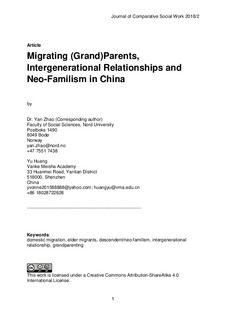Migrating (Grand)Parents, Intergenerational Relationships and Neo-Familism in China
Journal article, Peer reviewed
Published version

Åpne
Permanent lenke
http://hdl.handle.net/11250/2590950Utgivelsesdato
2018Metadata
Vis full innførselSamlinger
Originalversjon
Zhao, Y. & Huang, Y. (2018). Migrating (grand)parents, intergenerational relationships and neo-familism in China. Journal of Comparative Social Work, 13(2). doi: 10.31265/jcsw.v13i2.175Sammendrag
Based on a case study in one residential community in Shenzhen, China, this article explores the relationship between the migration of elder (grand)parents and the intergenerational relationship between the elders and their adult children. Specifically, we analyse how the intergenerational relationship influences and is influenced by the migration of the elders. The empirical data consists of eight qualitative in-depth interviews with elder migrants, who primarily migrated for helping with childcare. The analysis is embedded in theoretical discussions around Chinese descending/neo-familism (Yan, 2011, 2016), which depicts the significant changes that have taken place in Chinese family life, and new perceptions on the traditional ideals and norms regarding family relations in China (e.g. the notion of filial piety). Based on the analysis, this article argues that the migration of the elder (grand)parents is one specific form of descending/neo-familism, which entails an intergenerational solidarity that builds upon intimacy, with the focus and meaning of life flow downward to the third generation, as well as entailing aspects of self-salvation (Yan, 2017). However, it also identifies tensions between the generations that are further intensified by the migration, most notably the elder generation’s loss of autonomy and authority within the joint family structure. Furthermore, this article also raises some suggestions for social work intervention for this group.
